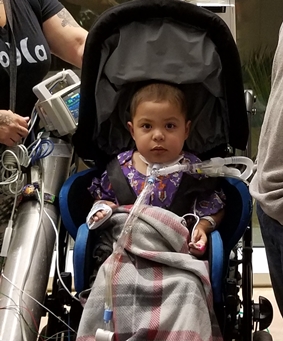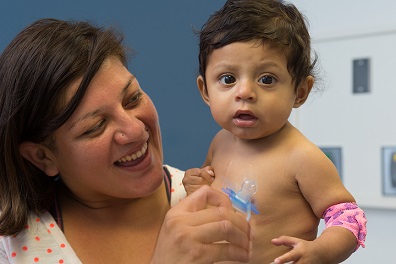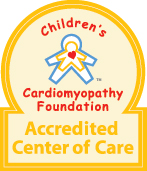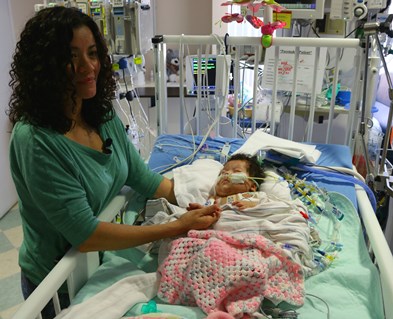Overview

Josiah was in a wheelchair before getting his new heart. Today, he’s walking and wearing a huge smile. See his amazing transformation.
Rady Children’s Heart Transplant Center is ranked among the nation’s best health transplant programs. Our healthcare professionals have developed a program that can provide heart transplants for every patient with congenital heart disease, from infancy through adulthood. At our heart transplant program your child will receive expert care from a highly skilled and experienced heart transplant team.
The center’s excellent outcomes for heart transplant recipients from healthcare professionals have made us a leading referral center for the entire Southern California region, as well as parts of Arizona, Hawaii and the South Pacific.
Because of our heart transplant team of medical professionals and services, we are also a California Children’s Services (CCS)-designated Center of Excellence, based on meeting strict quality outcomes criteria. CCS is a state program for children with certain diseases or health problems for children up to 21 years old.
Expert care and heart transplantation from our health professionals may be an option for your child if he or she has symptoms of heart failure from cardiomyopathy, congenital heart disease or life-threatening abnormal heart rhythms. Medical professionals from our Pediatric Heart Failure and Transplant Program will carefully and thoroughly evaluate your child to see if he or she is a suitable candidate for a transplant. If your child is deemed a suitable heart transplant candidate, the process can begin by preparing your child for the procedure. Learn about heart transplant surgery.
First ever dual heart-kidney transplant performed by our health professionals at Rady Children’s
Heart Failure and Transplant Program
The Pediatric Heart Failure and Transplant Program treats children who have primary cardiomyopathies or have developed heart failure as a result of a congenital heart defect.

In March 2015, at just 4 months old, Santiago became San Diego’s youngest heart transplant recipient. Read his remarkable story.
Our diverse team of specialists includes pediatric cardiologists, heart surgeons, nurses, geneticists, psychiatrists, neurologists, pharmacists, social workers and child life specialists, all with expertise in pediatric medicine. Together, we offer families a multidisciplinary approach to care at one of the most advanced programs for pediatric heart disease in the world.
Our team partners with the child’s entire family. We encourage open communication, welcome all questions about any aspect of their child’s care and are always available to explain the treatment plan and to re-evaluate a child as necessary. We also encourage each family to maintain a relationship with their referring physician, who is an integral part of their child’s care.
Some patients may see us only for an evaluation, while others may return for further therapy, including surgery or heart transplantation. In all cases, we will work with families and their physicians to provide the highest quality care.
 About Cardiomyopathy and Heart Failure
About Cardiomyopathy and Heart Failure
Cardiomyopathy translates to “heart muscle disease.” Children with cardiomyopathy have hearts that are bigger or stiffer than they should be, and this can sometimes change how well their hearts pump blood. There are three main types of cardiomyopathy: dilated cardiomyopathy, where the heart is enlarged; hypertrophic cardiomyopathy, where the heart muscle is thick; and restrictive cardiomyopathy, where the heart muscle is stiff.
Heart failure is when the heart is not pumping blood normally and can present with symptoms such as tiredness, breathing trouble, racing heart rate, leg swelling, dizziness, nausea or belly pain. Since babies and young children cannot always tell others how they feel, many children are not diagnosed with cardiomyopathy until symptoms of heart failure appear. In children without symptoms, cardiomyopathy may occasionally be detected during a routine pediatric exam. When cardiomyopathy is suspected, a full evaluation is necessary to help diagnose and treat the disease. In most cases, the cause of cardiomyopathy is unknown. Sometimes, cardiomyopathy occurs as a result of a metabolic or genetic problem.
What to Expect
When a family is referred to the Pediatric Heart Failure and Transplant Program, we arrange for an initial evaluation that usually lasts about three hours. Prior to the visit, the clinic coordinator gathers important information from the referring physician and the child’s parents to help determine which tests will be recommended.
While a family may be given preliminary information and perhaps treatment guidelines at the end of this visit, the full diagnostic evaluation is not complete until all the test results have been reviewed and the entire medical team has met to determine treatment recommendations. After this review, the pediatric heart failure cardiologist will discuss results of the evaluation and treatment plan with both the family and the referring physician.
Additionally, since we are involved in research, the child will be offered the chance to participate in any clinical trials that are appropriate. The clinical coordinator and cardiologist will discuss these options with the family. Participation in research is purely voluntary and deciding not to participate in a study does not affect the care a child receives from our team.
All of this is part of our comprehensive program – and world-class care.

Victoria stared heartbreak in the eyes, as her baby, Zoey, almost died from a congenital heart defect. A heart transplant saved her life. See her incredible story.
Before the Transplant
In order for the transplant to occur, a donor heart must be provided. Your child will be placed on a national transplant list through the United Network of Organ Sharing (UNOS), which matches donor organs with adults and children awaiting transplantation in the United States. How soon your child receives a heart is based on a number of factors, including medical urgency, your child’s blood type, the size of your child’s heart and time on the wait list.
While your child is waiting for a heart, our team closely monitors your child’s health and works with your family to provide the support you need. To prevent clots from forming in the heart, your child may be put on blood thinner medications. Your child may take medications to prevent dangerous heart rhythms from occurring as well, which are more frequent in failing hearts. We may also find ways to boost your child’s nutrition, as your child may have trouble taking in enough calories.
The Procedure
Once a suitable donor heart can be provided, a team (which includes a pediatric heart surgeon from Rady Children’s Hospital) travels to the donor hospital to retrieve the heart. The heart will be carefully transported back to Rady Children’s for the transplant surgery.
When the transplant begins, the surgeon will place your child on a heart-lung machine that takes over the work of your child’s heart. The failing, old heart is then removed, and the new donor heart is sutured into place. For children who have not had prior open heart surgery, the heart transplant surgery typically lasts six to eight hours.
Recovery
Recovering from the transplant typically requires a hospital stay of 10 to 14 days. If complications occur, they may include kidney dysfunction, infection, bleeding, and/or rejection.
To prevent rejection of the new heart, medications will be monitored and adjusted to suppress your child’s immune system without putting your child at undue risk for infection and other side effects. We will also monitor your child with regular echocardiographic studies and heart biopsies.
Although heart transplant patients must remain on various medications for the rest of their lives, most are able lead normal, active lives. Most children are able to eventually able to return to school full-time and often participate in activities they were unable to do before transplantation. We will work with you and your child to determine which activities your child can pursue.
In the News
- Anonymous heart donor gifts 6-year-old Chula Vista boy second chance at life, 10news.com
- Teen Gets First Dual Heart-Kidney Transplant at Rady Children’s Hospital, fox5sandiego.com
- Smallest Baby to Receive Heart Transplant in San Diego Heads Home in Time for Mother’s Day, cbs8.com
- Gift That Marks the End of One Baby’s Life Saves Another, 10news.com, features John J. Nigro, M.D.
- Story About a Young Boy’s Heart Is Sure to Touch Yours, cbs8.com, features John J. Nigro, M.D., and Adriana Tremoulet, M.D.
- Baby Makes History With Heart Transplant, Fox 5 San Diego
- 2 Twins, 2 Hearts in Two Months, U-T San Diego
- Rady Site of Second Pediatric Heart Transplant, SD News
- Child Heart Transplant a San Diego First, U-T San Diego
- 11-Year-Old Heart Transplant Patient, 1st in San Diego, Goes Home, Times of San Diego
-
Rady Children’s Doctors Perform Hospital’s First Pediatric Heart Transplant, Transplant Families
- 11-Year-Old Boy Undergoes First SD Pediatric Heart Transplant, SD News
